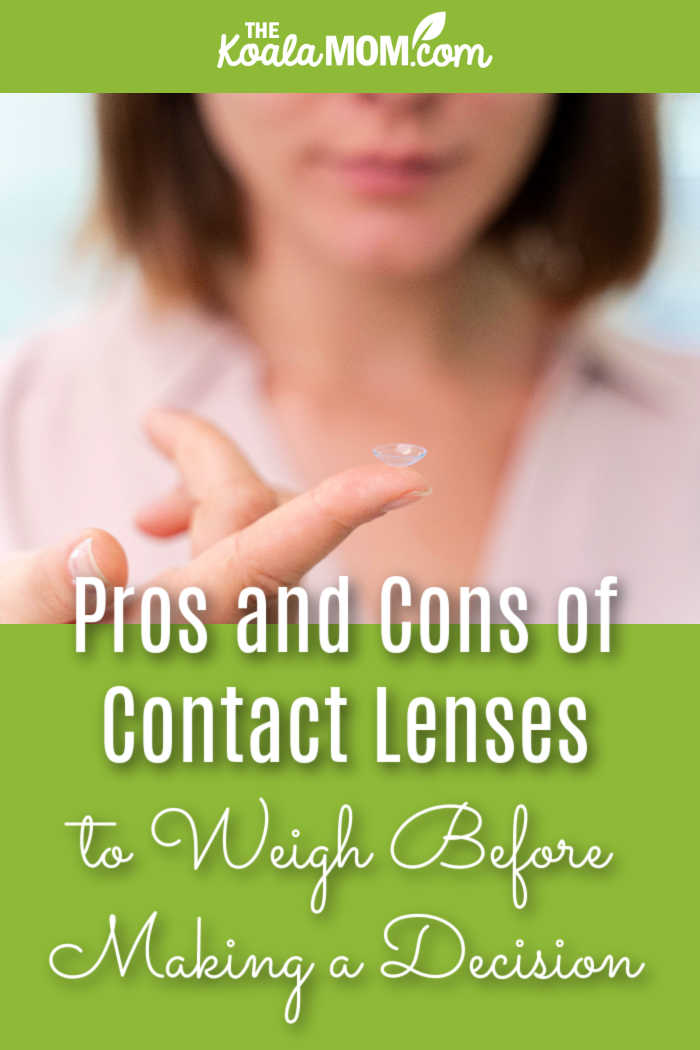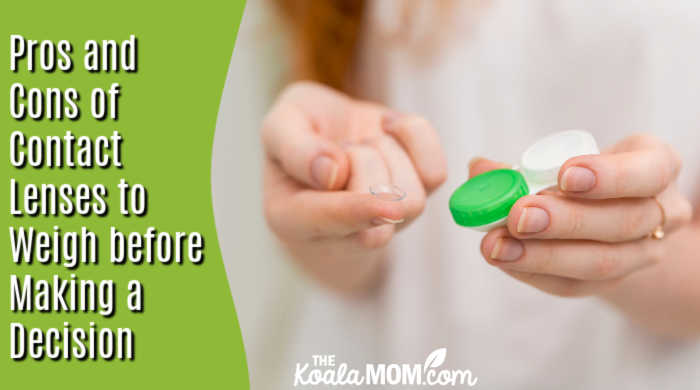When it comes to correcting your vision, you’ll find yourself choosing between two options: glasses and contact lenses. Let’s save the pros and cons of glasses for another day and focus solely on contact lenses.
According to the American Optometric Association, an estimated 45 million Americans wear contact lenses. They are worn to correct a range of refractive errors—nearsightedness, farsightedness, and astigmatism. I wore them throughout university to correct my farsightedness and astigmatism. That said, are contact lenses suitable for everyone?
Let’s weigh the pros and cons of contact lenses so you can make an informed decision about caring for your eyes.

This post contains affiliate links; as an Amazon associate, I earn from qualifying purchases.
Pros of Contact Lenses
The benefits of contact lenses include:
Better Field of Vision
Contacts sit directly on the eye. This ensures a wide and unobstructed field of vision. Your ophthalmologist will run a thorough contact lens exam, measuring the dimensions of your eyes, including the corneas, pupils, and irises. This will help ensure the correct prescription and provide you with contact lenses that fit comfortably.
Moreover, contact lenses move with your eyes, ensuring sharp, direct, and peripheral vision. Experts at Pearle Vision will provide contact lenses specifically made for your eyes.
Active Lifestyle Friendly
If you wear glasses and have an active lifestyle, chances are you break your frames regularly or get annoyed when they are mashed into your face, fogged over, or otherwise in the way. And let’s be real, prescription glasses are not exactly cheap. Contact lenses offer freedom of movement and convenience that glasses simply can’t match.
You will have the flexibility to enjoy all your favorite activities, including running, dancing, hiking, or even hitting the gym. This is especially true with contact sports like football or lacrosse, as contact lenses won’t interfere with your protective headgear.
Getting back into a more active lifestyle in the last few years also prompted me to start wearing contacts again. Now, I tend to put my contacts in when I’m hitting the ski hill (because my glasses don’t fit well underneath ski goggles) or when I’m heading swimming (so I can actually see where I’m going in the pool).
No Fogging or Smudging
Unlike glasses, contact lenses won’t steam up due to temperature changes. There’s nothing more annoying than being unable to see the trail in front of you because the air is cool but your body is hot from hiking and your glasses are repeatedly fogging over. And of course, contacts don’t get dirty from fingerprints (yours or your kids’) or water spots (hello, Raincouver). This will ensure comfort in various environments.
Cosmetic Freedom
Contact lenses can do wonders for your self-image and confidence. They don’t alter the facial appearance the way glasses can but give you a natural look. With contact lenses, you can show off your eye makeup and lash extensions and wear sunglasses without constantly switching frames.
Cons of Contact Lenses
On the flip side, here are some cons of contact lenses you should consider:
Risk of Infection
Contact lenses carry more risk than glasses. Oversight in lens care and improper handling can cause irritation, conjunctivitis, dry eye syndrome, and other uncomfortable eye problems. Almost all complications are caused by poor hygiene and maintenance.
Maintenance
Speaking of maintenance, it’s a big task. You need to follow a thorough cleaning and care routine, which can be a tad bit inconvenient. Disposable contact lenses help skip this, but they are more expensive. As a mom of young kids, I stopped wearing my contacts because this maintenance took too much time; it was easier simply to slap my glasses on my face in the morning and go.
Cost
Contact lenses can be more expensive than prescription glasses. Don’t forget the cost of lens solutions, storage cases, and replacements. You’ll also still need a pair of glasses to wear before you put your contacts in or after you take them out. Because I haven’t always had extended benefits, the cost of contacts was another reason that I switched back to wearing just glasses.

Not for Everyone
Some people with severe astigmatism, eye allergies, or certain eye diseases may find contacts unsuitable for regular use. Others find the very idea of putting anything in their eyes terrifying. (My kids have reacted in horror to watching me put my contacts in.) While learning to wear contacts does take some practice, some people simply cannot control their blink reflex or overcome this aversion to having things in their eyes. Always consult with your ophthalmologist before making a decision.

No Responses Yet